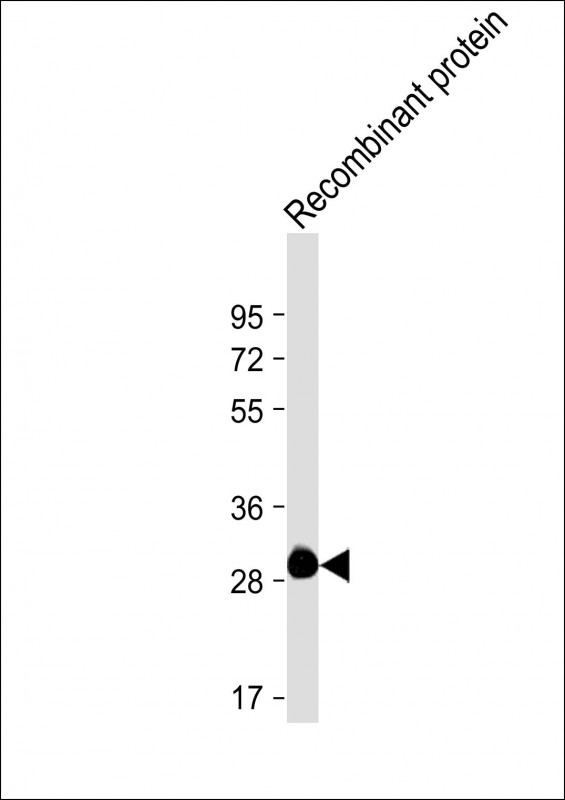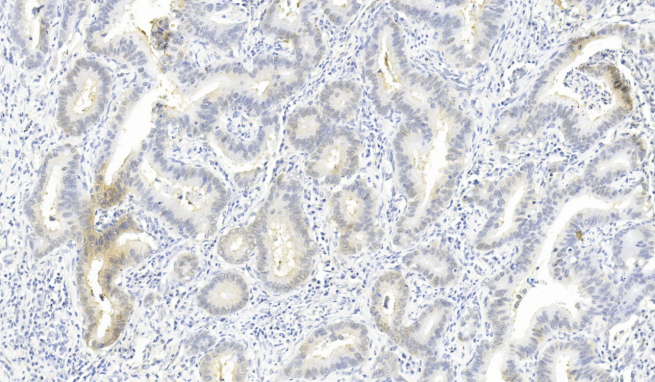

| WB | 1/2000 | Human,Mouse,Rat |
| IF | 咨询技术 | Human,Mouse,Rat |
| IHC | 1/250 | Human,Mouse,Rat |
| ICC | 技术咨询 | Human,Mouse,Rat |
| FCM | 咨询技术 | Human,Mouse,Rat |
| Elisa | 咨询技术 | Human,Mouse,Rat |
| Aliases | Proto-oncogene tyrosine-protein kinase ROS, 2.7.10.1, Proto-oncogene c-Ros, Proto-oncogene c-Ros-1, Receptor tyrosine kinase c-ros oncogene 1, c-Ros receptor tyrosine kinase, ROS1, MCF3, ROS |
| Entrez GeneID | 6098 |
| WB Predicted band size | 263.9kDa |
| Host/Isotype | Mouse IgG1 |
| Antibody Type | Primary antibody |
| Storage | Store at 4°C short term. Aliquot and store at -20°C long term. Avoid freeze/thaw cycles. |
| Species Reactivity | Human, Mouse, Rat |
| Immunogen | This ROS1 antibody is generated from a mouse immunized with a recombinant protein of human ROS1. |
+ +
以下是3篇关于ROS1抗体的参考文献摘要概括:
1. **《ROS1 rearrangements define a unique molecular class of lung cancers》**
- 作者:Bergethon, K. 等 (2012)
- 摘要:首次提出ROS1基因重排是非小细胞肺癌(NSCLC)的独立分子亚群,通过FISH和IHC(使用D4D6抗体)检测,证实其可作为克唑替尼治疗的靶点。
2. **《A Comparison of IHC, FISH, and NGS to Detect ROS1 Rearrangements in Lung Adenocarcinomas》**
- 作者:Shan, L. 等 (2016)
- 摘要:比较IHC(ROS1抗体克隆D4D6)、FISH及NGS检测ROS1融合的性能,发现IHC敏感性高(100%),但需结合FISH或NGS验证以减少假阳性。
3. **《Clinicopathologic Features of Non-Small-Cell Lung Cancer Harboring ROS1 Fusion》**
- 作者:Shaw, A.T. 等 (2014)
- 摘要:通过IHC和FISH分析ROS1阳性NSCLC患者的临床特征,强调抗体验证融合基因的重要性及其与ALK阴性患者的治疗差异。
4. **《ROS1 Immunohistochemistry for Detection of ROS1-Rearranged Lung Adenocarcinomas》**
- 作者:Yoshida, A. 等 (2013)
- 摘要:验证D4D6抗体在ROS1融合蛋白检测中的特异性(98%),提出IHC可作为大规模筛查ROS1重排的高效工具。
这些文献聚焦ROS1抗体的临床应用、检测方法对比及靶向治疗关联,适用于肺癌分子分型研究参考。
ROS1 (ROS proto-oncogene 1) antibodies are critical tools in molecular diagnostics and cancer research, particularly for identifying ROS1 rearrangements in non-small cell lung cancer (NSCLC). The ROS1 gene encodes a receptor tyrosine kinase involved in cell growth and differentiation. Chromosomal rearrangements (e.g., ROS1 fusions with CD74. SLC34A2. or other partners) result in constitutively active kinase proteins that drive oncogenesis. These fusions occur in approximately 1-2% of NSCLC cases and are more prevalent in younger, non-smoking patients.
ROS1-specific antibodies, such as those targeting the C-terminal kinase domain (e.g., D4D6 clone), are widely used in immunohistochemistry (IHC) to screen tumor samples for ROS1 overexpression, a surrogate marker for gene rearrangements. While IHC is cost-effective and rapid, positive results require confirmation by fluorescence in situ hybridization (FISH) or next-generation sequencing (NGS) due to potential cross-reactivity or variable antibody sensitivity. ROS1-targeted therapies, including crizotinib and entrectinib, show remarkable efficacy in ROS1-positive NSCLC, underscoring the clinical importance of accurate detection. Antibody-based assays thus play a dual role: aiding diagnosis and guiding personalized treatment. Ongoing research focuses on refining antibody specificity, optimizing diagnostic algorithms, and exploring ROS1 alterations in other malignancies like glioblastoma and cholangiocarcinoma.
×